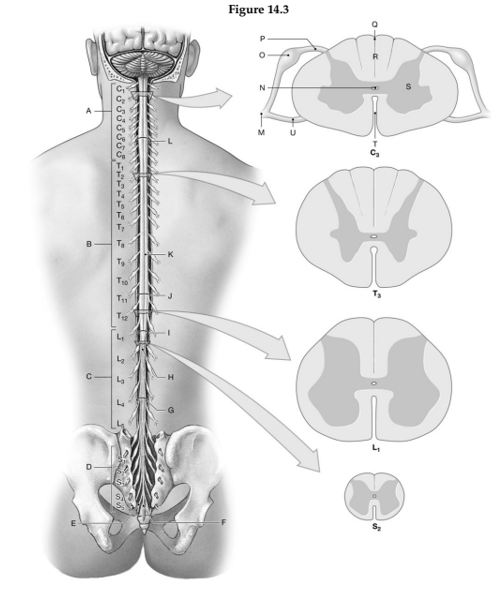Using the figure above, identify the labeled part.

1. Label A: ______________________________
2. Label B: ______________________________
3. Label C: ______________________________
4. Label D: ______________________________
5. Label E: ______________________________
6. Label F: ______________________________
7. Label G: ______________________________
8. Label H: ______________________________
9. Label I: ______________________________
10. Label J: ______________________________
11. Label K: ______________________________
12. Label L: ______________________________
13. Label M: ______________________________
14. Label N: ______________________________
15. Label O: ______________________________
16. Label P: ______________________________
17. Label Q: ______________________________
18. Label R: ______________________________
19. Label S: ______________________________
20. Label T: ______________________________
21. Label U: ______________________________
1. Cervical spinal nerves
2. Thoracic spinal nerves
3. Lumbar spinal nerves
4. Sacral spinal nerves
5. Coccygeal nerve (Co1)
6. Filum terminale (in coccygeal ligament)
7. Cauda equina
8. Inferior tip of cord
9. Conus medullaris
10. Lumbosacral enlargement
11. Posterior median sulcus
12. Cervical enlargement
13. Spinal nerve
14. Central canal
15. Dorsal root ganglion
16. Dorsal root
17. Posterior median sulcus
18. White matter
19. Gray matter
20. Anterior median fissure
21. Ventral root
You might also like to view...
Urine formed by the nephrons first drains into these
a) H b) I c) J d) K e) L
Erythropoietin (EPO) was first isolated from the urine of anemic patients who had high circulating levels of the hormone. Despite the presence of the hormone that stimulates red cell production, however, these patients were unable to produce adequate amounts of hemoglobin or red cells. Give some possible reasons that the patients' own EPO was unable to correct their anemia.
What will be an ideal response?
Diploë is spongy bone found in ________ bones.
A) short B) flat C) pneumatized D) sesamoid E) irregular
Match the eye structure with the appropriate description.A. Blood vessels enter and the optic nerve exits hereB. A small yellow spot near the center of the posterior retinaC. The portion of the retina with the greatest visual acuityD. A jelly-like substance in the posterior cavity of the eyeE. The fluid that fills the anterior cavity of the eyeVitreous humor
Fill in the blank(s) with the appropriate word(s).